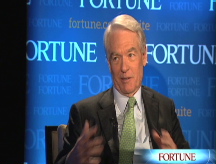Why a $1 trillion deficit is a good thing (for now)
The 2009 federal deficit is on track to set a record, but the usual risks don't apply at the moment .
NEW YORK (Fortune) -- It was already ominous enough that the U.S. budget deficit nearly tripled to $455 billion in the fiscal year that ended in September. Now, even conservative projections show that it is on course to explode into the stratosphere, exceeding the $1 trillion mark in the current fiscal year - and most likely, by a wide margin.
So, how alarmed should we be by this bleak prospect? The rational answer is that the soaring budget deficit is unavoidable and, in fact, necessary to help stabilize the economy through some extraordinarily difficult times.
Let's take a closer look at the issue - both the causes of the deficit as well as the concerns being raised by some fiscal conservatives.
The runaway deficit is the result of the convergence of three major factors:
1) The recession, which reduces tax revenues and increases certain types of spending related to higher unemployment and other welfare programs.
2) The steadily rising costs of the effort to address the financial crisis that burst onto the scene in September (takeovers of Fannie Mae (FNM, Fortune 500), Freddie Mac (FRE, Fortune 500), and AIG (AIG, Fortune 500), as well as capital injections into the banking system).
3) The soon-to-be announced, highly ambitious fiscal-stimulus package by the incoming Obama administration. The precise size of such a package remains unspecified, although "semi-official" hints have been given that it may be in the $600 billion to $800 billion range over several years.
All of the above forces represent an inescapable reality. Neither the recession nor the financial crisis were developments that could have been brushed aside. (The current recession is expected to continue till mid-2009, according to the consensus among economists, which would make it the longest contraction since the Great Depression.)
Although specific aspects of how the bailout funds have been used so far can be open to question, not undertaking a massive program of stabilizing the financial system in the last few months was never really an option, as it would have exposed the entire U.S. economy to a potentially catastrophic outcome.
Similarly, the Obama administration's stimulus package is not an elective development either. The need to undertake such aggressive spending is imperative, given the severely crippled state of economic activity.
The alternative, a smaller deficit based on more restrained spending, would almost certainly lead to an unthinkable outcome for the U.S economy. In a situation presenting itself so plainly, the current rumblings by some Congressional Republicans about the surging size of the deficit sound hollow and misguided, the product of rigid ideological adherence to the otherwise sound concept of fiscal discipline.
To be sure, the U.S. budget deficit is likely to approach 10% of GDP in the current fiscal year, an unprecedented rate; the previous high was 6% of GDP in fiscal year 1983 and the generally accepted rule is that a deficit should stay within 2% to 3% of the country's GDP. (By comparison, the deficits in the euro zone countries are capped at 3%, with some lenience only allowed recently as a result of the financial crisis.)
The main risks usually associated with a high deficit are:
1) The potential that the massive amount of borrowing that the government needs to undertake to finance it can squeeze the private sector out of the credit markets, therefore creating an intense competition for limited funds that can push interest rates higher.
However, such a risk is actually minimal in the current environment, where the weak economy has severely dampened the credit needs of the private sector and foreign investors seem to have, at least for now, an impressive appetite for U.S. Treasury securities that are issued to finance the deficit.
2) The risk that the deficit will cause inflation. This is true only when the Federal Reserve purchases large amounts of the newly-issued debt directly from the Treasury, a process called monetization. There is no serious evidence suggesting that the Fed is engaging in such large-scale operations and, in the past, it has consistently refrained from doing so.
The Fed has certainly not been shy about injecting massive amounts of liquidity into the banking system in the last few months, but this process is totally unrelated to the size of the budget deficit and it is meant to address a very different aspect of the current predicament for the U.S economy: unclogging the frozen credit pipelines.
3) Large budget deficits add to the national debt, causing ever-increasing interest payments and, therefore, representing a burden for future generations.
While no sane person can deny the nearly immoral aspect of that burden that is being passed on to the next generation, at the same time it's probably fair to say that the next generation would also have a keen interest in inheriting a functioning, thriving economy and not one that has been decimated by years of contraction caused by a blind adherence to the sacred principle of fiscal discipline.
Let's make no mistake: The surging budget deficits are not a pretty picture or a totally benign one either, and no argument can be made in favor of a more cavalier attitude toward fiscal discipline in normal or semi-normal times.
But these are extraordinary times and the deficits are just an unavoidable consequence - particularly considering the alternative.
Anthony Karydakis is a former chief U.S economist with JP Morgan Asset Management and currently an adjunct professor at New York University's Stern School of Business. ![]()
-
 The retail giant tops the Fortune 500 for the second year in a row. Who else made the list? More
The retail giant tops the Fortune 500 for the second year in a row. Who else made the list? More -
 This group of companies is all about social networking to connect with their customers. More
This group of companies is all about social networking to connect with their customers. More -
 The fight over the cholesterol medication is keeping a generic version from hitting the market. More
The fight over the cholesterol medication is keeping a generic version from hitting the market. More -
 Bin Laden may be dead, but the terrorist group he led doesn't need his money. More
Bin Laden may be dead, but the terrorist group he led doesn't need his money. More -
 U.S. real estate might be a mess, but in other parts of the world, home prices are jumping. More
U.S. real estate might be a mess, but in other parts of the world, home prices are jumping. More -
 Libya's output is a fraction of global production, but it's crucial to the nation's economy. More
Libya's output is a fraction of global production, but it's crucial to the nation's economy. More -
 Once rates start to rise, things could get ugly fast for our neighbors to the north. More
Once rates start to rise, things could get ugly fast for our neighbors to the north. More












